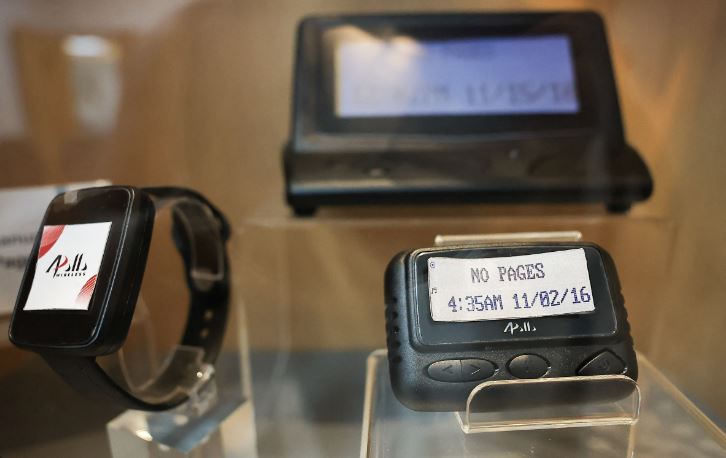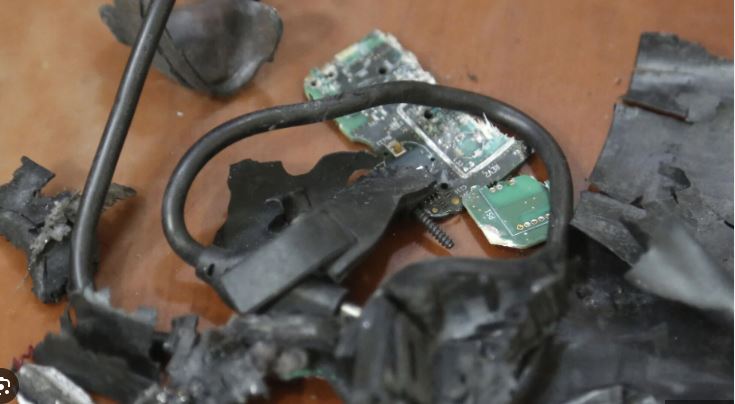Ban includes communication devices, including
mobile phones, pagers, and other handheld
gadgets, by its personnel and allied forces
News Desk

Tehran: In a sudden and sweeping move, Iran‘s elite Revolutionary Guard has imposed a ban on communication devices following a series of explosions involving pagers linked to Hezbollah operatives. The explosions, which occurred last week, raised concerns about potential security breaches and the vulnerabilities of using outdated or unsecured technology in sensitive operations.
The Incident: Explosions Linked to Hezbollah
The explosions, reportedly caused by tampered communication devices, particularly pagers, took place in Lebanon. Hezbollah, the powerful Iran-backed militant group, suffered casualties as several of its key members were injured or killed. Although official numbers have not been disclosed, local sources claim that at least three operatives were killed, and others sustained severe injuries.
The devices are believed to have been remotely hacked, triggering explosions that not only caused physical damage but also exposed the communications networks used by Hezbollah operatives. This incident has ignited alarm within Iranian intelligence circles, as it raises questions about the security of communication technology used by its allies in the region.
Revolutionary Guard Responds
The Revolutionary Guard, which has long maintained strong ties with Hezbollah, reacted swiftly to the incident. In an official statement released through state-run media, the Guard announced the immediate ban on the use of all personal and unauthorized communication devices, including mobile phones, pagers, and other handheld gadgets, by its personnel and allied forces.
The statement emphasized the need for enhanced security protocols, particularly in light of the evolving threats posed by cyber warfare and surveillance. “The enemy is using sophisticated methods to infiltrate and sabotage our defense networks. We cannot allow such vulnerabilities to jeopardize our operations,” said a senior commander of the Revolutionary Guard, who requested anonymity due to the sensitivity of the matter.

Strategic Implications
This ban is seen as a significant shift in the operational strategy of the Revolutionary Guard, which has traditionally relied on a range of communication tools to coordinate with allied forces, including Hezbollah. The move underscores the increasing challenges Iran faces in securing its communications, especially as adversaries, such as Israel and the United States, step up their intelligence-gathering and cyber-espionage efforts.
Experts suggest that the hacking and explosions could be part of a broader effort by foreign intelligence agencies to disrupt the operations of Iran and its regional allies. The Revolutionary Guard’s response indicates a heightened awareness of the need for more secure, encrypted communication methods, which are less susceptible to external interference.
Hezbollah’s Silence
Hezbollah, which often avoids public acknowledgment of internal losses, has remained largely silent on the incident. However, sources close to the organization suggest that the group has initiated an internal investigation to identify how the pagers were compromised. Security experts believe that this attack may prompt Hezbollah to overhaul its communication protocols, moving toward more advanced, encrypted systems to safeguard its operations.

Regional Tensions
The explosions come at a time of escalating tensions in the Middle East, particularly between Iran and Israel. Israeli intelligence agencies have long targeted Hezbollah operatives, and recent reports suggest that Israel has been intensifying its surveillance and cyber efforts against Iran and its proxies.
The pager explosions are viewed by some as a continuation of these covert operations, designed to destabilize Hezbollah’s infrastructure and limit its operational effectiveness in the region. Iran, in turn, has vowed to enhance its cyber defense capabilities and strengthen its networks to prevent further breaches.
Future Measures
In the aftermath of the explosions, the Revolutionary Guard is expected to introduce stricter protocols regarding the use of communication devices, both for its own personnel and for its regional allies. There are indications that Iran may also ramp up its production of secure communication devices, potentially integrating more advanced encryption technologies to mitigate similar incidents in the future.
In addition, there is speculation that the Revolutionary Guard could collaborate with Russia or China, both of which have advanced cyber capabilities, to bolster its defense systems. This would allow Iran to safeguard its communication channels while maintaining a high level of operational secrecy across its regional networks.

Conclusion
The ban on communication devices marks a significant shift in the Revolutionary Guard’s operational approach, as the group prioritizes security in the face of growing cyber threats. The pager explosions linked to Hezbollah have not only highlighted vulnerabilities within the group but have also triggered a broader conversation about the risks associated with unsecured communication methods in modern warfare.
As Iran and its allies continue to face pressure from foreign adversaries, particularly through cyber-attacks and intelligence operations, the Revolutionary Guard’s decision to ban communication devices may be the first step in a broader overhaul of its military and intelligence strategy in the region. The Middle East remains on edge as this latest development underscores the ongoing covert battle for dominance and security in one of the world’s most volatile regions.























